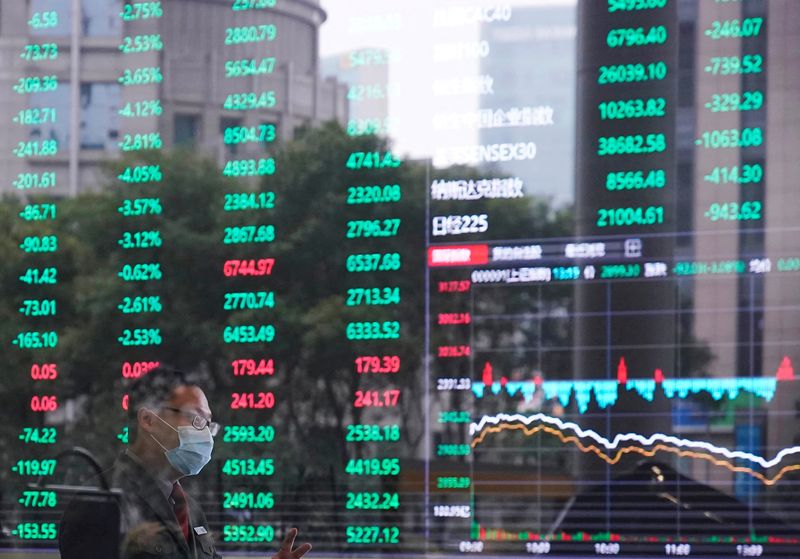By Jamie McGeever
(Reuters) - A look at the day ahead in Asian markets from Jamie McGeever, financial markets columnist.
Asian markets could not be in better spirits going into the latest South Korean interest rate decision and Chinese trade data on Thursday, thanks to the dollar's slump and global market rally on Wednesday sparked by another steep decline in U.S. inflation.
The one percentage point fall in June headline consumer price inflation to 3.0% strengthened hopes that the U.S. economy is heading for a 'soft landing', boosting risk appetite and, more importantly for emerging markets, slamming the dollar.
The greenback fell around 1.2% against a basket of major currencies on Wednesday, its biggest fall since November, to its lowest in over a year. Latin American currencies hit a 10-year high, and emerging Asia FX could follow that lead on Thursday.
Asia and Pacific currencies in the G10 space were among the best performers on Wednesday. The New Zealand and Australian dollars surged 1.6%, both chalking up their biggest one-day rise since January, and Japan's yen rose 1.4% for its best day since March.
The yen has risen five days in a row, its longest winning streak against the dollar since November. It is up 5% in that time, which has cooled talk of yen-supportive intervention from Japanese authorities and contributed to Japanese stocks' decline of around the same magnitude.
The kiwi dollar's rally came as traders digested the central bank's decision on Wednesday to hold its cash rate steady at 5.5%, hitting pause as expected and flagging that rates would be on hold for some time. Most economists still expect rate cuts to come in 2024.
The Thai baht, meanwhile, may be subject to greater-than-usual volatility and political risk on Thursday as Thailand's parliament convenes to elect a prime minister, paving the way for a new government to be formed, likely by early next month.
The outcome of Thursday's vote is far from certain.
And the South Korean won will take its cue from the Bank of Korea's policy decision and guidance. All 46 economists in a Reuters poll say the BOK will keep its key policy rate unchanged at a 15-year high of 3.50% and for the rest of the year.
Inflation is at its lowest in 21 months and getting closer to the BOK's 2% target, so the won could be sensitive to guidance on when the bank might begin easing policy.
Chinese trade figures are expected to show yet another sharp fall in cross-border activity last month, with exports and imports predicted to fall 9.5% and 4.5% year on year, respectively. That would be the biggest fall in exports since January - economists at SocGen are penciling in a 15.7% crash.
Yes, trade data from China could dampen the mood in Asia, but it would have to be a particularly gloomy set of numbers for the feelgood factor infusing markets to fizzle out completely.
Here are key developments that could provide more direction to markets on Thursday:
- South Korea interest rate decision

- China trade (June)
- Thailand parliament elects new prime minister
(By Jamie McGeever; Editing by Josie Kao)